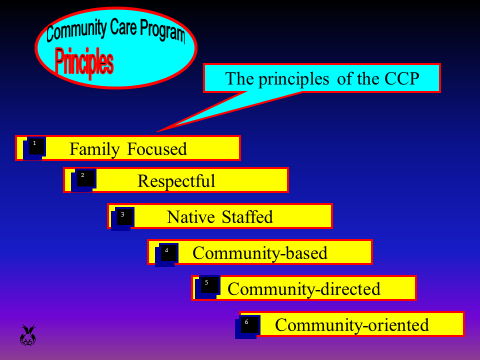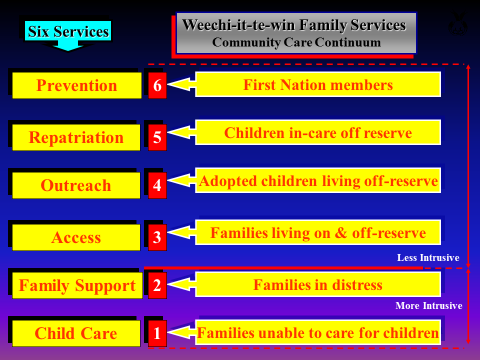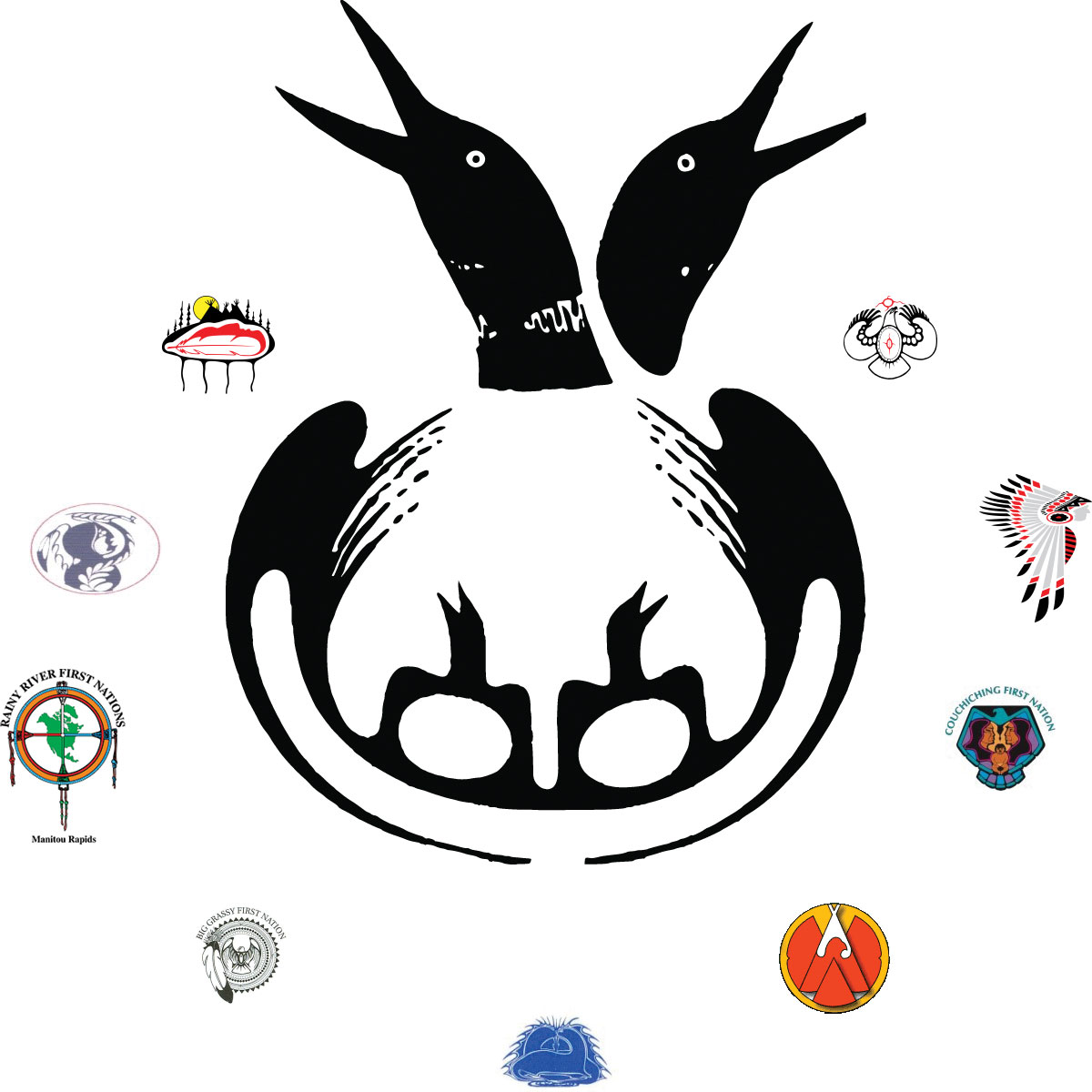Community Care
"... when things are going right... as young people, they [the children] are provided with their gifts for life. Parents and everyone around the child are to encourage the young to maintain the positive practices [of their community]..."
from the Men's Gathering, May 11-12, 1999
Our Chiefs envisioned Weechi-it-te-win's Community Care Programs (CCP) as the first step in reversing the effects of decades of interference by non-Anishinaabe child welfare authorities. It was also seen as a vital first step towards the resurgence of traditional customs and practices which form the basis of our Anishinaabe Child Care Law.
In 1983, Weechi-it-te-win's Native Child Welfare Planning Committee developed the "vision" of Community Care which consisted of 3 primary goals:
1. To preserve Anishinaabe identity and culture among our people
2. To strengthen and maintain Anishinaabe families and through them our communities
3. To ensure the growth, support, and development of all our children within Anishinaabe families and communities.
The Planning Committee envisioned an all-encompassing community care program reflective of traditional child rearing practices pursuant to the traditional and customary Anishinaabe Law. The fact that the Community Care Program was and continues to be community driven and community directed is something that truly distinguishes these programs from other child welfare services in the Country.

- Community Care
- Resource Links
- Anishinaabeg of Naongashiing
- Big Grassy River Community Care Program
- Rainy River First Nations Community Care Program
- Naicatchewenin First Nation Community Care Program
- Mitaanjigamiing First Nation Community Care Program
- Couchiching First Nation Community Care Program
- Nigigoonsiminigaaning Community Support Services
- Seine River Community Care Program
- Aa-kwii-no-win Community Care Program
The six (6) program components of Community Care
Community Care Objectives

- Prevention:
Since time immemorial, our communities had a natural, comprehensive, well developed prevention systems for child abuse and neglect. These systems were based on teachings (traditional laws). Responsibilities for child rearing were shared among many extended family and community members. This system is present within the natural world today. Children thrived under the watchful eyes of parents, grandparents, elders, and extended family while at the same time learning life and social skills that would help them to become healthy, productive and purposeful human beings.Weechi-it-te-win and the Community Care Programs have been instrumental in revitalizing preventative practices in the communities. Formal and informal prevention initiatives exist in our communities. These may be structured or non-structured and designed for the whole community, higher risk groups, or specific families in need.
- Repatriation:
Until 1986, entire generations of children were removed from our communities by authorities that did not understand our culture or ways of life. Reuniting displaced children with their families and communities of origin and/or helping them to establish a link with their culture and heritage is an ongoing objective of the community care programs. - Outreach:
Most children taken from our communities and adopted by non-Anishinaabe families in Canada and the U.S.A. are now adults. There are also children that may have been apprehended, placed, and adopted outside of our jurisdiction. Many of these adults and children have not been told of their Anishinaabe heritage and some may be confused about their cultural identity. The two tasks of Outreach Services are to:1. establish linkages between individuals who seek an understanding of their culture and heritage within their home communities;
2. to keep Anishinaabe children who have been adopted outside of their community and their adoptive parents aware of their Anishinaabe heritage.
- Access:
The majority of our members reside outside of the First Nations, within towns or other urban centres that can be a significant distance from their home community. Our members face many challenges living in urban centres and many may not be accustomed or equipped to deal with the array of issues that can occur. Access services ensure that members of our First Nations living both on and off reserve have access to appropriate services and resources such as: intake and assessment, representation at court proceedings, referrals, advocacy and family support. - Family Support:
The provision of support to families at risk and/or families in crisis is the cornerstone of Weechi-it-te-win Family Services and the Community Care Programs. We believe families that are supported and encouraged will become stronger and healthier.Regardless of the challenges that families may be experiencing, we believe that families have specific rights including:
The right to be respected
The right to be treated fairly and with dignity
The right to be treated in a non-judgemental manner
The right to be listened to
The right to participate in all aspects of case planning that pertains to them and their children
The right to supportive services which are consistent with their culture, heritage, customs, traditions and spiritual beliefs.
Some examples of family support include:
Home visits by natural and professional helpers
Homemaker services
Material aid such as emergency financial assistance from groceries/clothing/shelter
Advocacy
Referral to other helping resources and agencies such as elders, healing lodges, treatment programs or other social services
Parent education programs
Parent respite
Family and/or individual counselling
- Child Care
The services we provide for children are wholistic and extend from in-home support to out-of-home placement. Supporting children within their families and communities is of paramount concern to WFS. For this reason, emphasis is placed on the use of family and community resources that will protect children while at the same time strengthening the family and respecting their integrity as a unit.Services to children may include:
Mobilizing community resources to restore patterns of child protection
Strengthening the linkages between children and their extended families
Restoring and reinforcing the sacred value of children in their families and communities
Culturally restorative investigation and assessment when abuse is alleged
Case planning
Referral to traditional healers or other cultural resources
Short term or long term out of home placement
Placement support
The provision of service that nurture the child's whole well-being, and which are congruent with the child's need for continuity within their family and home community
Community Care - The Mandate
In March of 1982, the then Rainy Lake Region Tribal Area Chief's resolved to create an "Anishinaabe Alternative" to child welfare, appointing a Native Child Welfare Planning Committee to develop a concept. What was developed was Community Care.

- Home
- |
- About
- |
- Investigation & Assessment
- |
- Naaniigaan Abinoojii
- |
- Developmental Support Services
- |
- Nanaandawewenin
- |
- Healing, Clinical & Support Services
- |
- Abinoojii Inakonigewin
- |
- Cultural Resources
- |
- Community Care
- Resource Links
- Anishinaabeg of Naongashiing
- Big Grassy River Community Care Program
- Rainy River First Nations Community Care Program
- Naicatchewenin First Nation Community Care Program
- Mitaanjigamiing First Nation Community Care Program
- Couchiching First Nation Community Care Program
- Nigigoonsiminigaaning Community Support Services
- Seine River Community Care Program
- Aa-kwii-no-win Community Care Program
- |
- Careers
- |
- News
- |
- Events
- |
- Contact
B1455 Idylwild Drive Fort Frances, Ontario, Canada, P9A 3M3 AP.O. Box 812, Fort Frances, Ontario, Canada, P9A 3N1
x807-274-3201 j24 Hour Response: 1-800-465-2911 Careers Contact us
Contact Us
1455 Idylwild Drive (Nanicost Building)
Fort Frances, Ontario, Canada, P9A 3M3
A P.O. Box 812, Fort Frances, Ontario P9A 3N1
x 807-274-3201 G 807-274-8435